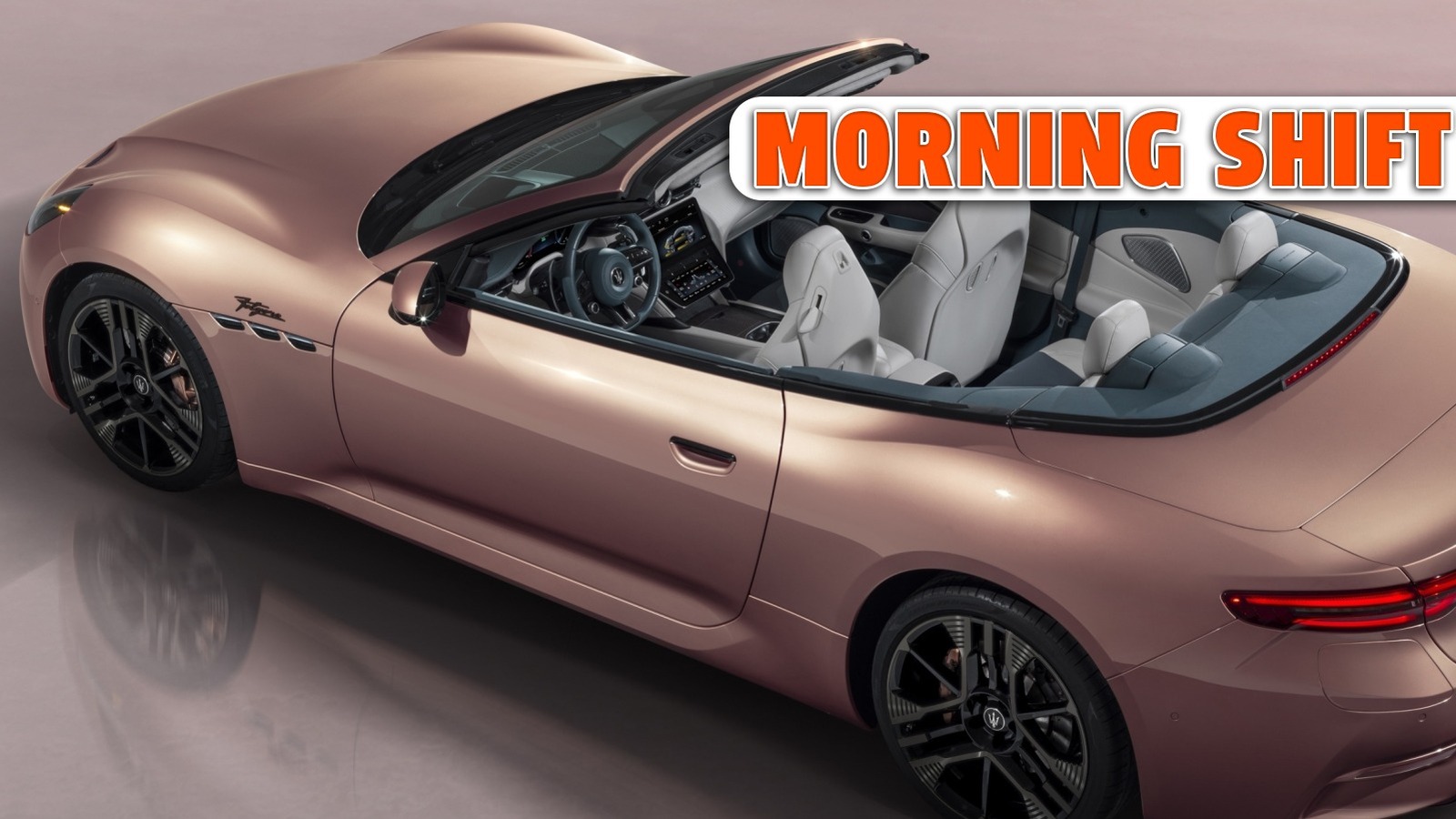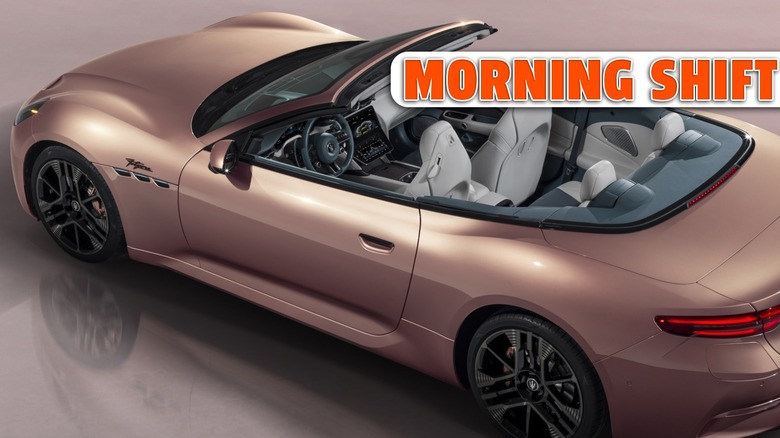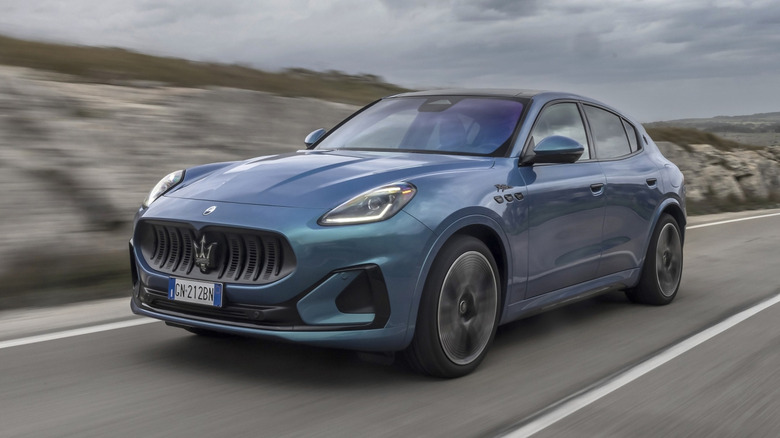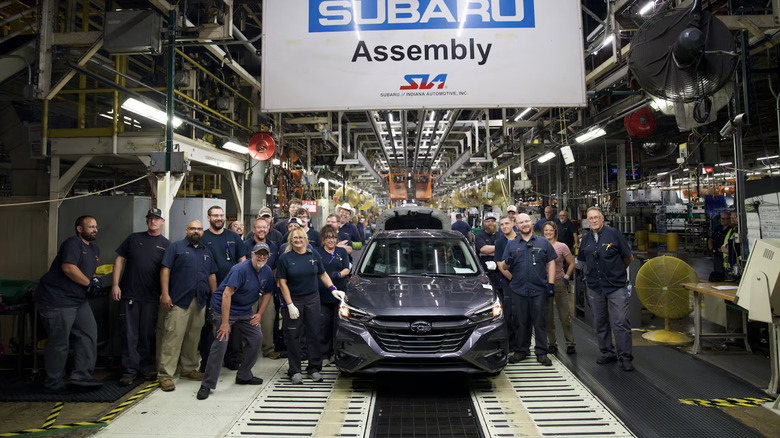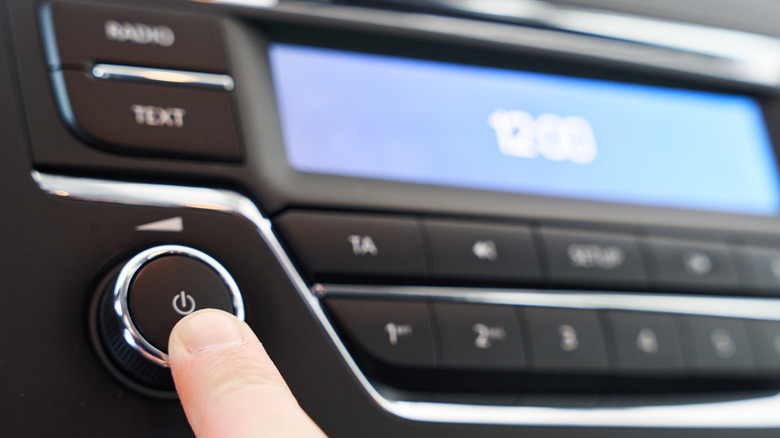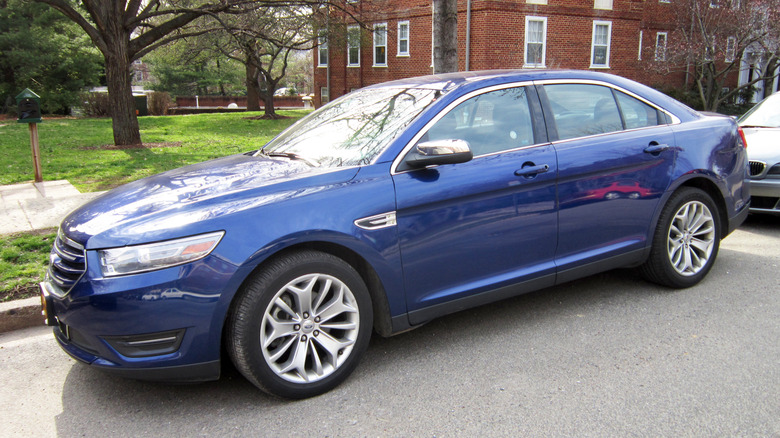Good morning! It’s Friday, September 19, 2025, and this is The Morning Shift, your daily roundup of the top automotive headlines from around the world, in one place. This is where you’ll find the most important stories that are shaping the way Americans drive and get around.
In this morning’s edition, Maserati says it’s done with the idea of going all electric, Subaru says goodbye to Legacy production in the U.S., the AM radio might be saved and Ford ends the week the right way (with another recall).
1st Gear: Maserati knows an all-EV future isn’t coming soon
Oh, how quickly things changed. Not so long ago, it seemed pretty much inevitable that Maserati would follow through on its plans to be fully electric by the end of the 2020s, but those dreams are all but forgotten at this point as Stellantis’ Italian luxury brand looks to change course. Instead of that wholesale switchover, the plan is for it to keep offering a mix of powertrains.
It needs to do something to turn the ship around as rumors swirl about its overall future and it attempts to dig itself out of a deep financial hole. Clearly, an all-EV lineup in today’s climate wasn’t going to be the answer. From Automotive News:
“The market has spoken” on electric vehicles, said Maserati Americas head Andrea Soriani, so the brand has turned its attention to selling “the right products for the clients” in gasoline as well as EV form. It’s seeing “a mix of demand,” he said, and will produce both.
The Grecale, GranTurismo and GranCabrio each have gasoline and electric versions already. Soriani said the brand is working on a range of new products.
In the last two years, Maserati has eliminated V-8 engines from its lineup by dropping the Levante, Quattroporte and Ghibli. Instead, it’s been focused on delivering electric supercars, with prices ranging from around $200,000 for the 751-hp GranTurismo Folgore to more than $300,000 for the 621-hp MC20.
The Grecale midsize crossover, available in mild-hybrid, gasoline and electric varieties, now carries the volume load as Maserati’s only offering under $100,000.
[…]
“We live in a time of high uncertainty,” Soriani told Automotive News in August during Monterey Car Week in California. “We get different news every day on the global economy. It’s a very tough political environment. Globally, there are a lot of disruptions in the supply chain.”
Everything has been a big bummer for Maserati lately. Its adjusted operating margin was a less-than-ideal -25% across all markets in 2024, and its global sales dropped 58% to just 11,300 units. A bit more than half of that volume came from the U.S. alone: 5,720 sales.
I’m really not paid enough to know how to turn Maserati around, but I feel like focusing on quality and vehicles people actually want to buy is a good place to start. The move down market of the mid-20-teens was a strategic error from the looks of it, so it might be time to abandon that sort of repeat move.
2nd Gear: Good night, and good luck, Subaru Legacy
Goodnight, sweet prince. Production of the Subaru Legacy — the first model the automaker built at its Indiana plant — has come to an end. The final 2025 Legacy sedan, finished in Magnetite Gray, rolled off the line in Lafayette just past 3 p.m. local time on September 12 — nearly 36 years to the day after it first started.
The Legacy, of course, would become an icon of the brand and served as a genesis for the Legacy wagon and Outback crossover, which still endures today. Unfortunately, there’s just not enough of an appetite for midsize sedans to keep the Legacy around. I get it, but it is a bit sad nonetheless. From Automotive News:
The plant was a joint venture between Subaru’s parent company, then known as Fuji Heavy Industries, and Isuzu Motor Co. In addition to the Legacy sedan, Isuzu produced a small pickup at the plant. Subaru soon added a Legacy wagon, and later the Outback midsize crossover, to the production line.
Isuzu added the Rodeo SUV and later built a version for Honda called the Passport.
The joint venture ended in December 2002. In 2005, Toyota Motor Corp. became a major Fuji investor, and by 2007, the first project between the two companies began: Toyota Camry production at the Indiana plant. Camry output lasted there until May 2016.
While the plant has produced a variety of products — Subaru later added the Impreza compact sedan and hatchback, Ascent large crossover and, more recently, the Crosstrek subcompact crossover — the Legacy remained a constant presence in Lafayette.
The plant said it built around 1.4 million Legacy vehicles across seven generations.
In April of 2024, Subaru said the Legacy nameplate would be retired. It’s sort of easy to see why. Last year, sales hit just 19,591 units. That’s a 23% drop. Ouch. So long, Legacy. We owe so much to you.
3rd Gear: The U.S. House wants the AM radio to stick around
A panel of U.S. House lawmakers has advanced a bill that would mandate AM radios be included in all new vehicles for at least eight years. I know this sounds a bit silly — because who the hell uses AM radios anyway — but it’s actually a super valuable tool in emergency situations. On top of that, who wants a car with fewer features?
The bill directs the Transportation Department to, within a year, issue a rule requiring automakers to offer AM radios on new vehicles at “no additional” cost “beyond the base price of the passenger motor vehicle.” From the Detroit News:
“I know quite well how crucial AM radio is for receiving emergency alerts during hurricane season, for consumers and rural communities to people stuck without electricity or internet during a national disaster,” said U.S. Rep. Gus Bilirakis, R-Florida. He is the chief sponsor of the measure.
Bilirakis continued: “AM radio is their lifeline to critical and life-saving information. This bill makes sure that consumers don’t lose that lifeline.”
The measure, amended Wednesday by the U.S. House Committee on Energy and Commerce, is an apparent compromise between emergency management groups, automakers and fans of talk radio shows that are broadcast primarily through AM channels. The auto industry has opposed AM requirements in new vehicles, citing costs and declining AM radio listenership.
Michigan U.S. Rep. Debbie Dingell, D-Ann Arbor, suggested that she brokered the compromise after speaking with automotive executives, broadcasters and other stakeholders.
“When this issue was raised in the last Congress, I personally engaged with the automakers and their CEOs about the critical role AM plays, and they told me directly that they would continue offering it in their vehicles and work in good faith with us on a path forward,” she said. “And they kept their word. That’s why we’re here today.”
The panel voted 50-1 to advance the measure out of committee, with some Republican joker from California — Jay Obernolte — as the only dissenting voice.
I’ll tell you what, it’s nice to see Congress actually hold corporations responsible for something for once… even if that something is as small as the inclusion of an AM radio antenna.
4th Gear: Three cheers for a Ford recall
Folks, it’s been a trying week to say the least. It’s hard to know where the world is heading as social and societal norms seem to keep eroding around us. I do have some good news, though, that’ll bring us all some sense of normalcy: Ford issued another recall, its 112th of the year. From Reuters:
Ford Motor is recalling 101,944 Taurus sedans in the United States due to a defect that could cause door trim to detach while driving, the National Highway Traffic Safety Administration said on Friday.
The issue involves the B-pillar trim on the driver and front passenger doors, which may come loose during vehicle operation. Detached trim pieces could fall onto the road, causing a road hazard, NHTSA said in the notice.
The recall affects vehicles from model years 2016 through 2019, the U.S. auto safety regulator said, adding that Ford dealers will inspect the affected vehicles and repair or replace the trim as needed, free of charge.
While I do feel for the owners who have to deal with this, there are a few things that make me feel better: 1) They knew what they were getting into. 2) It’s a small sacrifice to make the rest of us feel better.
Reverse: I get it, Nikita.
I’d also be super ticked off if someone told me I couldn’t go to Disneyland if I really wanted to. If you want to learn more about one of the stranger chapters of the Cold War, head over to History.com.
On the radio: New Radicals – You Get What You Give
Folks, it’s Friday. Turn the music up and enjoy yourself. It’s been a rough week. You’ve earned this.


